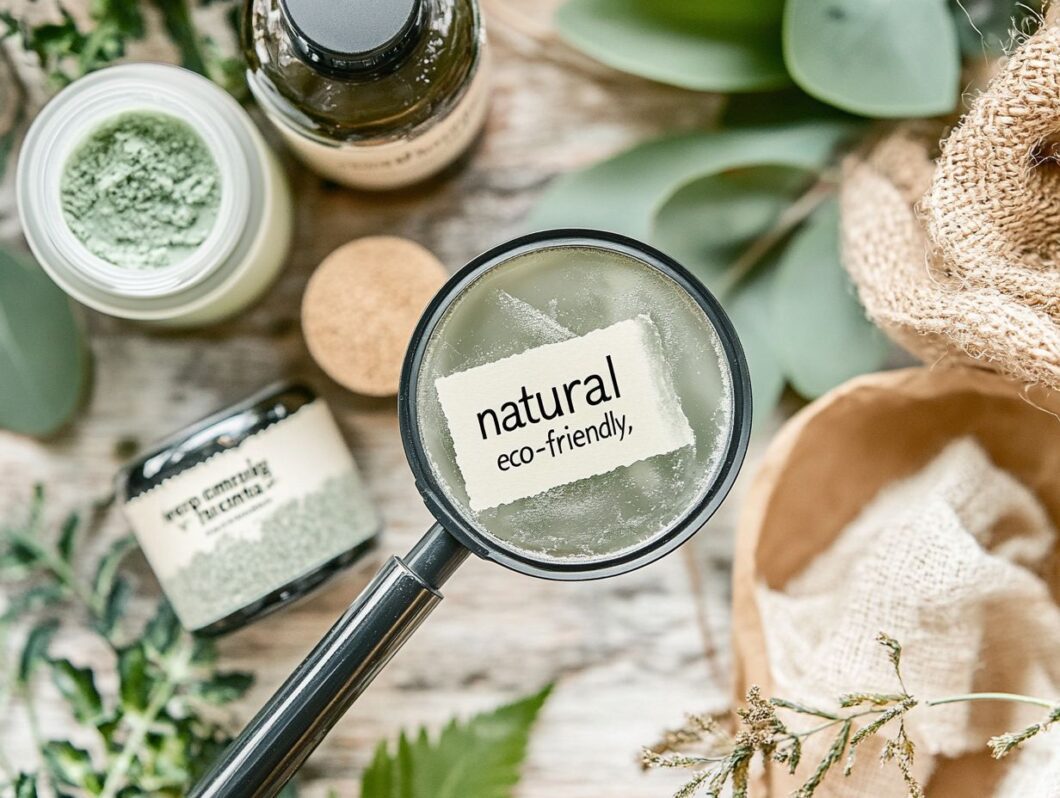In today’s eco-conscious world, I recognize that the beauty industry is increasingly embracing sustainability; however, I understand that not all claims are genuine.
Greenwashing—when companies misleadingly portray their products as environmentally friendly—can deceive consumers who are striving to make ethical choices. This article aims to unpack the concept of greenwashing, highlight its prevalence in beauty products, and provide insights into identifying deceptive marketing practices.
I will explore the importance of supporting truly ethical brands and offer practical tips to help you make informed decisions in your beauty routine.
Key Takeaways:
What is Greenwashing?
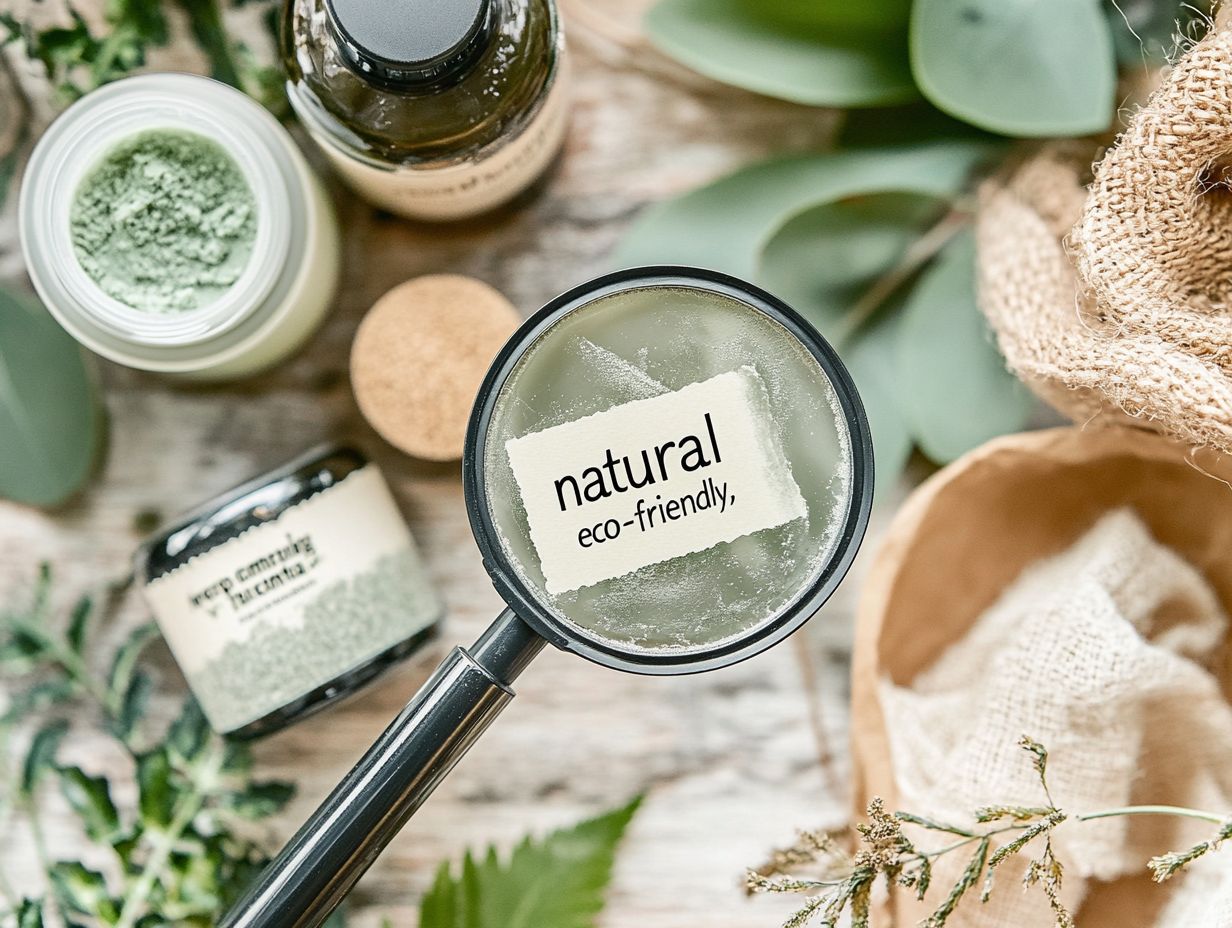
Greenwashing is a deceptive marketing practice that I find concerning, as it involves companies falsely promoting their products as environmentally friendly or sustainable. This misleads consumers into thinking they are making eco-conscious choices.
Often, this entails exaggerated or even false claims about a product’s environmental impact, creating an illusion of corporate responsibility while neglecting to implement genuine sustainable practices.
As I observe the increasing awareness among eco-conscious consumers regarding these tactics, it is clear that the demand for transparency and accountability in the beauty industry is escalating. This shift is prompting brands to adopt more ethical practices to protect their reputations.
Defining the Term
Defining greenwashing requires a thorough understanding of its fundamental elements as a marketing strategy that emphasizes appearance over genuine environmentally friendly practices.
This deceptive approach often presents itself through misleading advertising, where companies promote vague claims like “eco-friendly” or “natural” without providing any substantial evidence to back these assertions.
For instance, a beauty brand may label its product as “clean” solely because it lacks certain harmful ingredients, while failing to address the environmental impact of its manufacturing processes.
Similarly, companies might use terms such as “sustainable packaging” while utilizing minimal recycled content or neglecting to disclose the sourcing of their materials.
This tactic creates a false sense of transparency and trust, leading consumers to believe they are supporting authentically sustainable practices when, in reality, they are being misled by clever marketing strategies.
Greenwashing in the Beauty Industry
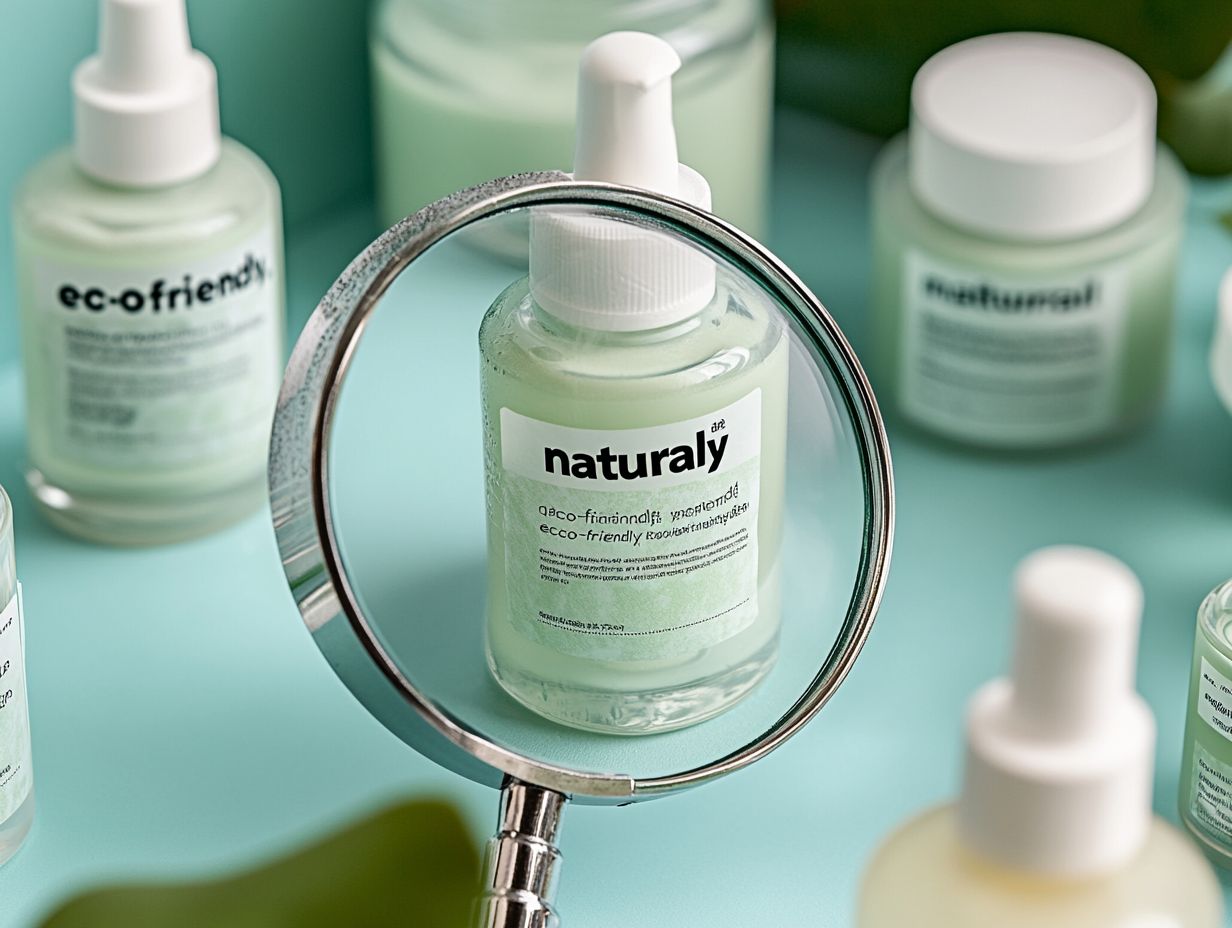
I have observed that greenwashing has permeated the beauty industry, resulting in a rise in misleading claims from brands that promote their products as eco-friendly or sustainable without providing substantial evidence of their environmental impact.
This situation undermines consumer trust, as beauty shoppers frequently struggle to differentiate between brands that genuinely commit to sustainability and those that employ deceptive marketing tactics.
As awareness of these issues grows, the demand for authentic sustainable beauty products is increasing, leading to a shift in the industry towards more ethical practices and greater transparency.
Examples and Impact on Consumers
In my observations of the beauty sector, I have noted several instances of greenwashing where brands employ misleading packaging practices and vague environmental claims. This approach ultimately confuses beauty shoppers regarding the authenticity of the products they are considering.
For example, a brand may prominently feature a single naturally derived ingredient while conveniently omitting the fact that the majority of its formulation consists of synthetic substances. This selective transparency can mislead consumers into believing that their purchasing decisions align with their values, when, in reality, they may inadvertently support harmful practices.
This disconnect can significantly erode trust and loyalty, particularly as consumers become more informed and increasingly demand independent verification of sustainability claims. Over time, such tactics may backfire, leading to backlash from discerning shoppers who seek brands that genuinely prioritize eco-friendly practices over opportunistic marketing strategies.
How to Identify Greenwashing
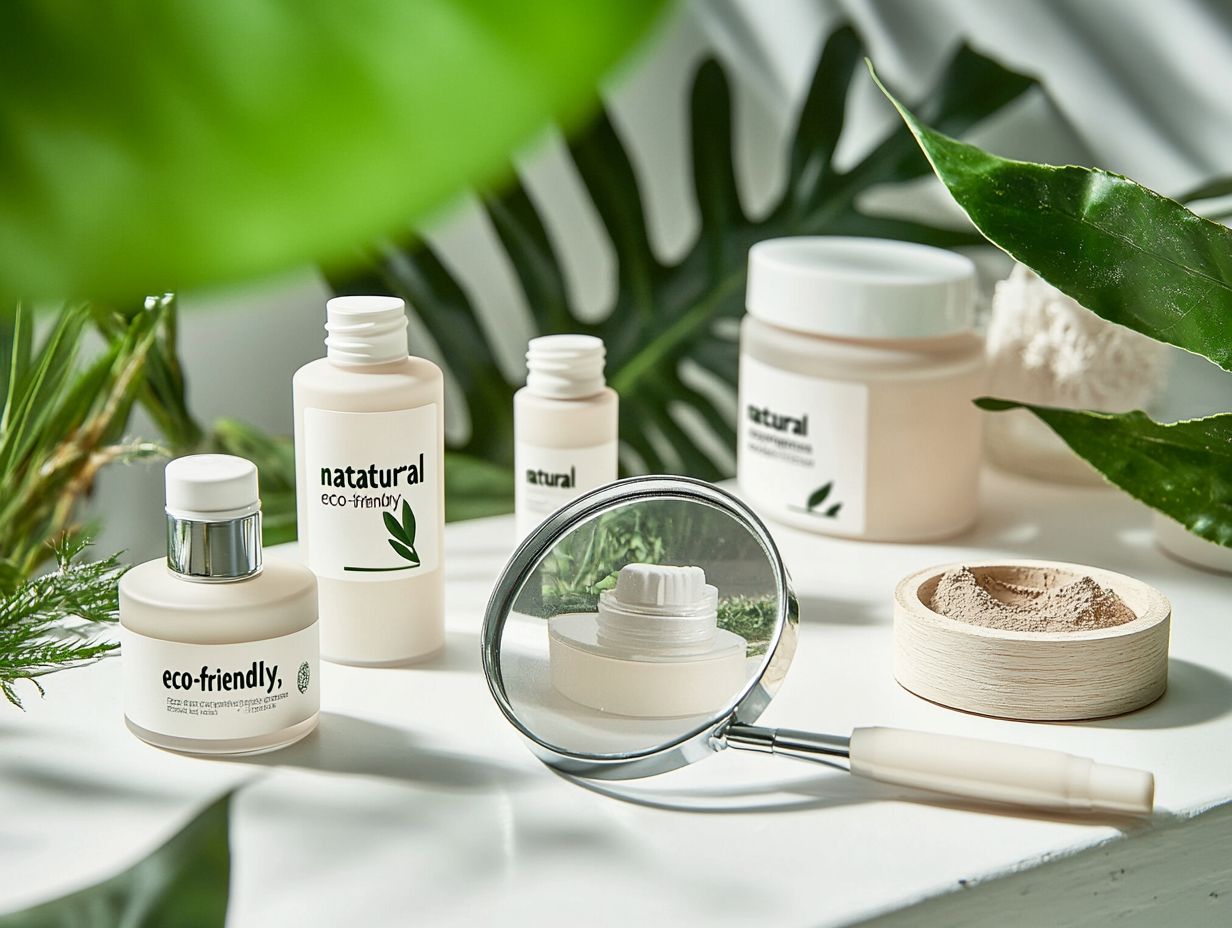
Identifying greenwashing necessitates that I remain vigilant and well-informed, as numerous brands utilize sophisticated marketing tactics to disguise their actual environmental impact.
I pay close attention to key red flags, such as vague language, exaggerated sustainability claims, and the lack of third-party certifications like COSMOS or EcoCert, which can verify a product’s environmental assertions.
As an informed beauty shopper, I increasingly rely on ingredient scrutiny and packaging analysis to uncover the truth behind misleading advertising in the beauty industry.
Red Flags to Look Out For
I recognize several red flags that may indicate potential greenwashing. For instance, the use of vague terms such as “natural” or “eco-friendly” without clear definitions often raises concerns.
Additionally, I pay close attention to ingredient lists for harmful chemicals that may be concealed despite claims of clean beauty.
I remain cautious of packaging that features misleading recycling symbols, as they can create a false impression of sustainability while the product may not be fully recyclable.
It is essential for me to scrutinize claims made on labels suggesting that a product is biodegradable, especially when it may only break down under specific industrial conditions that many consumers might not be aware of.
Furthermore, I consider the absence of certification from reputable environmental organizations as another indicator that a product may not meet its proclaimed environmentally friendly standards, which raises questions about its authenticity and trustworthiness.
The Importance of Ethical Beauty Products
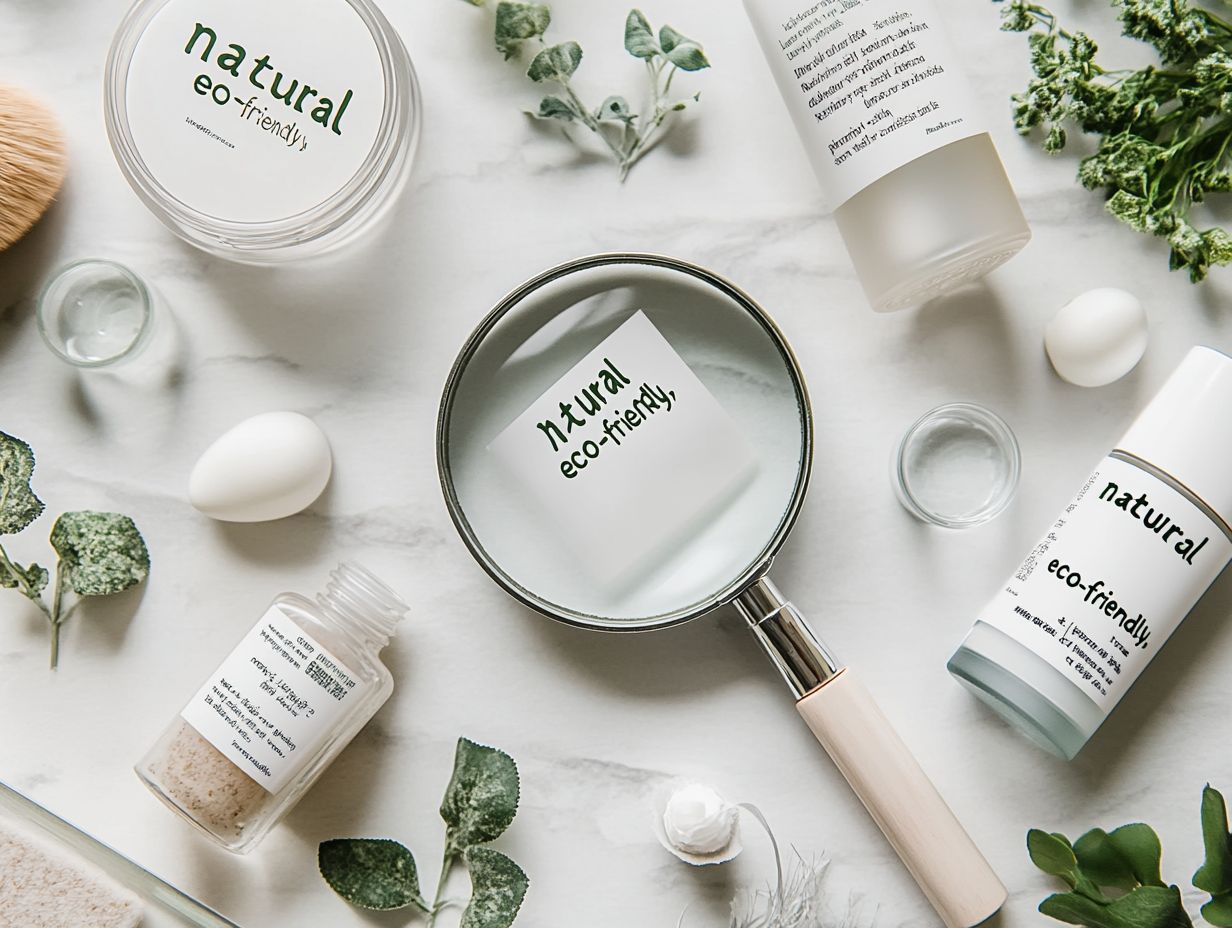
The significance of ethical beauty products is evident in their ability to support sustainability initiatives and promote social responsibility within an industry that has faced considerable scrutiny regarding environmental impact and misleading marketing practices.
As I observe consumers placing greater importance on clean ingredients and ethical practices, it becomes clear that brands must align their product offerings with these values. This shift encourages a more transparent and responsible approach to beauty, benefiting both the industry and its consumers alike.
Benefits of Choosing Ethical Brands
Choosing ethical brands provides numerous benefits, such as positively contributing to the clean beauty movement and reducing overall environmental impact. This aligns with my values as an eco-conscious consumer who seeks transparency and sustainability.
By opting for responsible brands, I not only enjoy products that are free from harmful chemicals but also support fair labor practices and animal welfare. Ethical beauty brands often prioritize sustainable sourcing and utilize recyclable packaging, which significantly reduces their carbon footprint.
As a consumer, I play a vital role in encouraging companies to adopt environmentally friendly practices, thereby amplifying the message of sustainability within the beauty industry.
These collective choices enable me to advocate for a healthier planet while fostering a market that values integrity and social responsibility. Ultimately, this paves the way for a more conscious world.
Tips for Avoiding Greenwashing
To avoid falling victim to greenwashing, I engage in thorough research and educate myself about the beauty products I use, prioritizing eco-conscious choices that align with my values.
This involves carefully examining ingredient lists for harmful chemicals and assessing brands’ sustainability missions alongside their marketing strategies to ensure a genuine commitment to environmental responsibility.
Research and Education
Research and education play a critical role in avoiding greenwashing. I make it a priority to familiarize myself with the ingredient lists of the brands I choose and seek out products that have received third-party certifications from recognized organizations such as COSMOS and EcoCert.
Understanding the intricacies of what goes into personal care and household products not only builds my trust in those products but also allows me to distinguish between genuine eco-friendly options and mere marketing tactics.
By examining the claims made by brands, I can identify credible evidence of sustainable practices and steer clear of misleading labels.
Independent certifications serve as reliable benchmarks, giving me peace of mind as I ensure my purchases align with ethical and environmental standards. This enableed approach enables me to make healthier, more responsible decisions that resonate with my values.
Alternative Brands and Products
Exploring alternative brands and products has allowed me to discover companies that are genuinely committed to sustainable development and clean beauty principles. Many of these brands are often recommended by holistic estheticians who prioritize ethical practices in their selections.
Brands like Tata Harper and RMS Beauty serve as prime examples of this commitment. They provide luxurious skincare and makeup options that are not only effective but also environmentally friendly. These companies prioritize the use of organic ingredients sourced from local farms and strive for zero-waste packaging to minimize their environmental impact.
Holistic estheticians frequently advocate for products from these brands, highlighting their alignment with clean beauty standards that eschew harmful chemicals and synthetic additives.
For instance, Tata Harper’s formulations, which incorporate plant-based oils and botanical extracts, exemplify a dedication to purity that resonates with consumers looking for natural solutions in their beauty routines.


